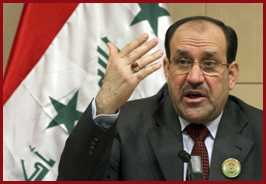Iraq's Maliki Government On Life Support? genre: Just Jihad & Polispeak & Six Degrees of Speculation

While many observers are debating the effectiveness of the latest troop surge in Iraq, an even more disturbing issue may be developing…one that could lead to the complete unraveling of what is already a relatively dysfunctional government. Conflict is nothing new to the fledgling government, but current events could be the final impetus in toppling the already weakened Maliki led coalition.
BAGHDAD - Iraq is in the throes of its worst political crisis since the fall of Saddam Hussein with the new democratic system, based on national consensus among its ethnic and sectarian groups, appearing dangerously close to collapsing, say several politicians and analysts.
This has brought paralysis to governmental institutions and has left parliament unable to make headway on 18 benchmarks Washington is using to measure progress in Iraq, including legislation on oil revenue sharing and reforming security forces.On Wednesday, the Iraqi Accordance Front said it pulled out of Mr. Maliki's coalition government, but would return its six cabinet members if the prime minister met a list of demands. The Sunni bloc says it wants, among other things, pardons for detainees not facing specific criminal charges and for all militias to be disbanded.
If they pull out, it would bring to 12 the number of vacancies in Maliki's 39-member cabinet.
Simple math tells us that if nearly a full third of the government is on the verge of withdrawal, the Maliki government is perilously close to failure. Numerous critics of the war, including many within the Democratic Party and a few Republican defectors, have been arguing that the situation in Iraq cannot be solved militarily and that it must be addressed primarily through political diplomacy and reconciliation.
However, the truth of the matter is that the Bush administration continues to sell the continuing U.S. occupation, as well as the recent troop surge, on the grounds that Iraq has become the central front in the war on terror. Unfortunately, that argument continues to ignore the fundamental issue that will ultimately need to be resolved in order to establish an Iraqi national identity...sectarian differences.
The apparent shortsightedness of the President is either a grave flaw or he has elected to string the American public along with a military rationale knowing full well that the task at hand is much larger and will require many more years of U.S. involvement and oversight…a position he likely realizes would not be palatable to an already reluctant citizenry. Either way, the goal of a democratic Iraq is more likely a function of fiction than a calculation of fact.
And since Saturday, US Ambassador Ryan Crocker has been shuttling between Iraq's top leaders, but an embassy spokesperson said this was not necessarily indicative of a crisis.
"The surge has done well in making a difference in security conditions. But it isn't a light switch for reconciliation; there are no quick fixes to years of bitterness and violence," he said.Robert Springborg, director of the Middle East Institute at the University of London, says the heart of the problem was that no one is truly committed to a strong and unified government.
"The actors involved have their own agendas, the central government and its resources are a tool for their own aspirations ... none are committed to a government for all Iraqis," he says.
Pointing to the growing disconnect between Washington and Baghdad, Askari, Maliki's adviser, says, "Washington believes that passing the oil law will impact on reconciliation and the security situation. We beg to differ. This matters little to the armed groups that kill Iraqis every day. Their sole agenda is to reverse what we have achieved so far."
Despite my intense criticism of the Bush administration, I do realize that the United States faces a difficult predicament now that we have toppled the Hussein regime. Nonetheless, the initial miscalculations, coupled with a seemingly persistent and unyielding stubbornness, have simply served to compound the ongoing dilemmas we have faced and will therefore continue to face.
When that basic reality is added to the intransigent and arrogant nature of the neocon mindset…a mindset that has been allowed to influence each decision…it is difficult to predict the point at which an honest evaluation can be completed…let alone when such an evaluation can be used as the backdrop for real discussions and meaningful solutions.
Whether the Bush administration will ever acquiesce to such an approach remains the critical factor. All signs suggest that moment remains a very distant and doubtful dream. In the meantime, the American public will no doubt have to endure more of the Bush administration’s ongoing nightmare…an American administration in denial and a dysfunctional and divided Iraq.
Tagged as: George Bush, Iraq, Neocon, Nouri al-Maliki, Sectarian, Shiite, Sunni
Post a comment